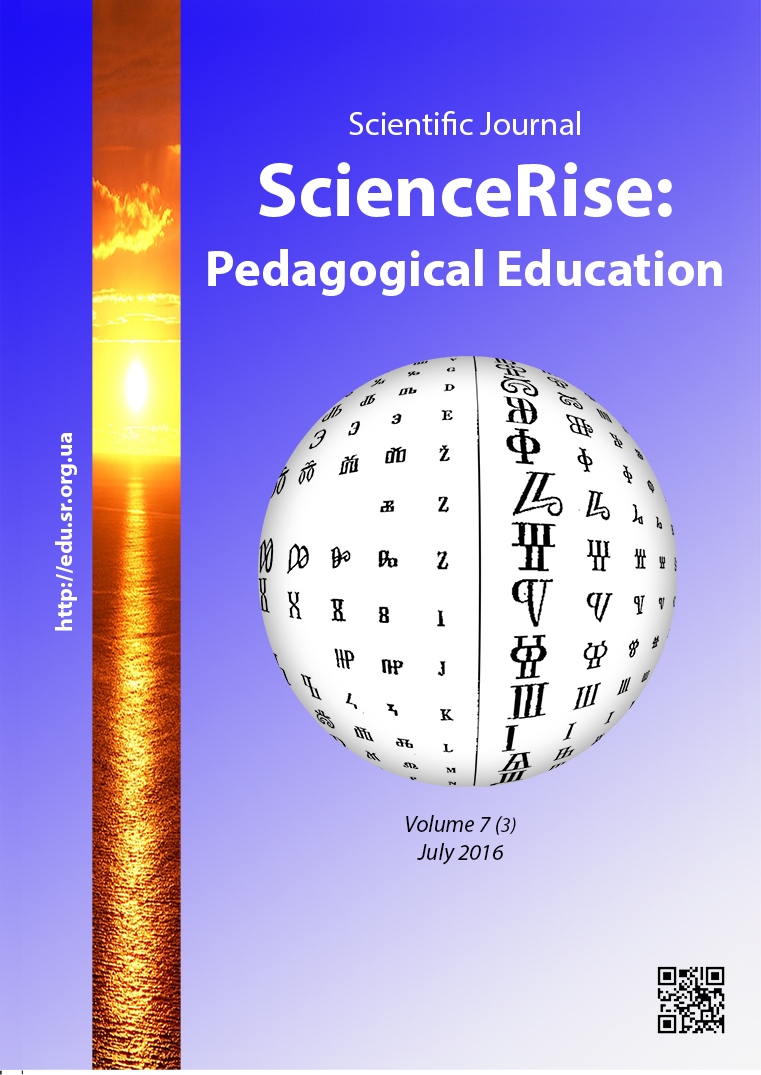Essessment of effectiveness of management by quality of general secondary education at region
DOI:
https://doi.org/10.15587/2519-4984.2016.74465Keywords:
management by quality of general secondary education, criterion, indicator, levels of efficiency, regional educationAbstract
The article is defined the problem of assessment of effectiveness of management activity; it is grounded criteria, indicators and levels of management effectiveness by quality of general secondary education; it is analyzed different approaches to evaluate the effectiveness of management activity; the attention is accented on the fact that presence of theoretically worked out system of assessment gave the possibility to assess in objective way the effectiveness by quality of management of general secondary education at the region; it is proved that the specialists of the organs of management of regional education, school leaders, district methodologists of methodological offices were not familiar with the mechanisms of quality management of general secondary education and required implementation of effective means of managerial influence; it is made the analysis of key tendencies and approaches to assess the quality of education as basis for its functioning and development; it is highlighted the levels of efficiency of management by quality at general secondary education at the region: elementary, middle, sufficient, high; it is established that the specificity of management by general secondary education at the region was the interdependence of internal (at the level of general educational institution) and external (at the level of local and regional management) of assessment of quality of education; it is grounded notions and categories that revealed the scientific aspects of management by quality of secondary education at the region
References
- Elnikova, G. V. (1999). Scientific bases of development of management by general secondary education at the region. Kyiv: DAKKO, 303.
- Kuznetsova, O. P., Denysova, I. S., Chernyshova, T. S. et. al. (2008). Monitoring of quality by school education. Management by quality of education, 3, 45–62.
- Lukina, T. O. (2006). Monitoring of quality of education: theory and practice. Кyiv: Publishing house «School world»: Ed. L. Galitsynа, 128.
- Dmytrenko, G., Olyinyk, V. V., Anufrieva, O. L. (1996). Aimed management: measurement of efficiency of activity of pupils and pedagogues. Кyiv: UIPKKKO, 84.
- Zaychuk, V. O. (2009). Management by quality of education as component of State educational policy. Pedagogy and psychology, 1, 56–78.
- Меlnyk, N. (2012). We inculcate monitoring of education. Suchasna osvita. Available at: http://www.osvita.ua/school/manage/981/
- Chernov, S. I., Novikova, М. М., Gaiduchenko, S. О. (2014). Text of lectures on the discipline «State and regional management». Kharkiv: KNUCI, 140.
- Tsvetkov, V. V.; Shemshuchenko, Yu. S., Averianov, V. B. (Eds.) (1996). State management: the main factors of efficiency (political and legal aspect). Kyiv: Right, 146.
- Busel, Т. (Ed.) (2001). Great dictionary of contemporary Ukrainian language. Кyiv, Іrpin: «Perun», 1426.
- Моksheev, V. (2005). Оrganization of system of monitoring in education. School technologies, 1, 85–94.
- Тypical statement about department education of regional, regional in city Kyiv and Sebastopol State administration (1999). Cabinet of Ministry of Ukraine, 347. Available at: http://uazakon.com/document/spart92/inx92502.htm
Downloads
Published
How to Cite
Issue
Section
License
Copyright (c) 2016 Світлана Федорівна Одайник

This work is licensed under a Creative Commons Attribution 4.0 International License.
Our journal abides by the Creative Commons CC BY copyright rights and permissions for open access journals.
Authors, who are published in this journal, agree to the following conditions:
1. The authors reserve the right to authorship of the work and pass the first publication right of this work to the journal under the terms of a Creative Commons CC BY, which allows others to freely distribute the published research with the obligatory reference to the authors of the original work and the first publication of the work in this journal.
2. The authors have the right to conclude separate supplement agreements that relate to non-exclusive work distribution in the form in which it has been published by the journal (for example, to upload the work to the online storage of the journal or publish it as part of a monograph), provided that the reference to the first publication of the work in this journal is included.







